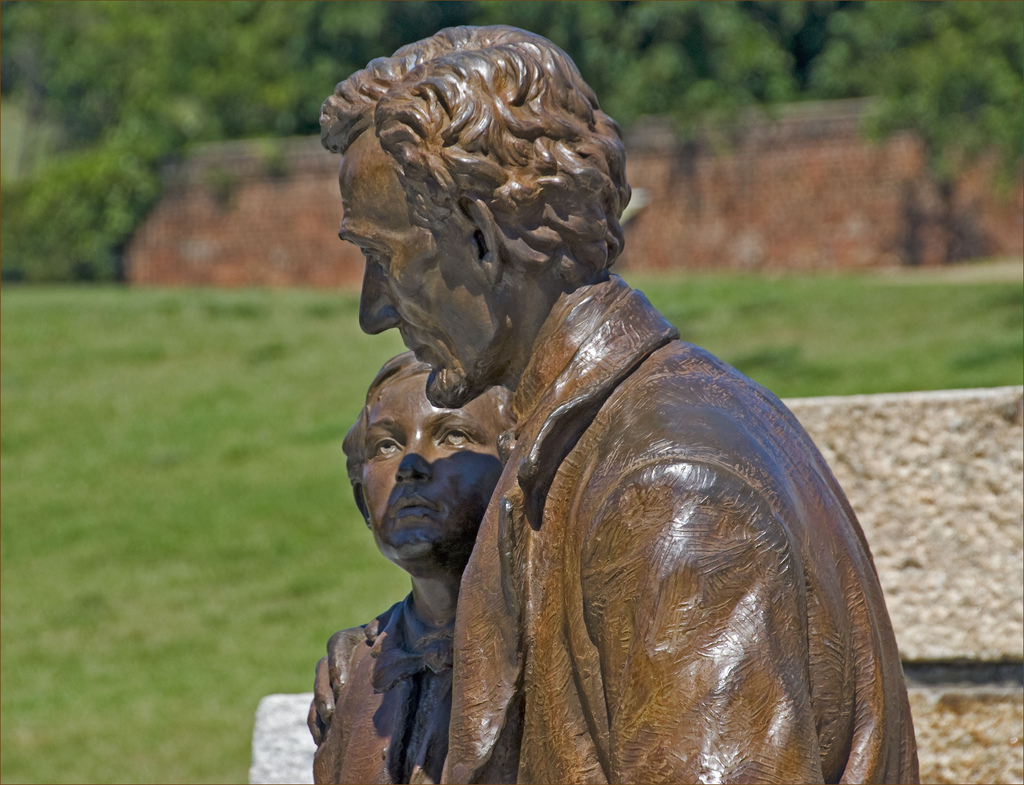Anna Fischer
Many believed her a woman because she had wide, rough palms, a certain firmness of the jaw, and detested the frivolities of childhood. The wise know, however—and the foolish ought to be taught—that belief does not dictate fact, and in reality, factually and unequivocally, she was but a girl of twelve or thirteen. She was sturdy around the middle like a redwood and stumpy about the frame like a honey mushroom and often she was posed mid-act of shooing the neighborhood littles from her property like the sentried arms of a saguaro. But if one deigned a closer look at her close-set eyes, closely set beneath her thick dark brows thickly darkening her expression, an observant observer could certainly ascertain the distant spark of youthful vigor. She was simply a girl consecrated under the holy ground of womanly burden, buried in the hardened flesh of her foremothers.
Due to the taxing effort of such observation, very few of her acquaintances, simply put, liked her. But that does not mean that she was not loved. There was a sickly inhabitant of the house on the northwest corner of her street who fancied himself a poet. Perhaps it was because his frailty prevented him from raunching about with the other boys his age, or because his status as an orphan had ostracized him from his peers; whatever the reason, tragedy was certainly involved, because every sane person knows that no one of their pedigree of sanity yearns to be a poet. Yet, on cool nights when our sickle-shaped poet—back permanently bowed from years of writing during pubescent bone generation—shuffled two hundred yards southeast to deliver a ballad to the girl everyone thought was a woman.
When the cock cried at dawn, thus arose our womangirl (alternatively, girlwoman). She began her morning chores in the small scruffy patch of grass behind her home (alternatively, yard). She collected the eggs from her spiteful hens with as much delicacy as her work-weathered hands would allow and suffered each bone-rapping peck with the dignity of a woman. It was only the hens who saw her this way: the tension in her forehead divested, rolling away like the tide, the smoothing of wearied wrinkles at the corner of her squinted eyes, a general softening that would prompt an onlooker to generously estimate her age as twenty instead of thirty-seven. Most peculiar about her time with the hens was the way she cooed to them with gentle maternity, calling tenderly their names one by one (Matilda, Edith, Gertrude, etc) for though she was womanly in countenance, she was not motherly. She was most often perceived as a spinster or a widow, those hard women whom society has exiled and ridiculed, women who are barely women at all. Women who are witches.
On this particular day-dawning, her hen time was interrupted by the solid sounds of soles crunching ground underfoot, the gait of a four-legged animal. She lifted her head, which had been nuzzling the irritated wing of poor Edith, her wrinkles swiftly falling back into place, her brows scrunching together with indescribable intensity, and pointed her small hooded eyes toward the crackling intrusion of her peaceful dawn. What rounded the corner was not, however, a fawn or beaver or forest creature at all, but a pair of two-legged men, walking in perfect asynchronous steps.
They were a funny little pair; all of the attributes that one possessed, the other lacked. One was condensed (Stately, plump) while the other was stretched thin and tall; one had the sloping, delicate nose of a freshly born babe while the other flaunted an ostentatiously aquiline profile; one was of light complexion with watercolor eyes and hay-bale hair while the other’s facade darkened like storm clouds prophesying hail. In conclusion, one could not have existed without the other. Their existence was dependent and diuturnal; they were the moon and the tide, the needle and the thread, humanity and production, life and death.
As they approached their medium pitch (one low, one high) murmuring came into focus for our young heroine’s ears.
—This must be her, do you not think? remarked the one she called Pomp.
—Certainly, must be her, I do think, responded the other she called Plucky.
—Are you sure this is not her mother? Pomp.
—Let us consult the parchment. Plucky.
They stopped short, but fifteen feet from her, and Plucky removed a yellowing piece of parchment from his breast pocket. Together they leaned over it, nodding and mumbling indistinctly in tandem. Then, with no warning and in a single, swift movement, Plucky folded the document and returned it to his pocket. They continued their onetwothreefourfivesixseveneightnineteneleventwelvethirteenfourteenfifteen step journey and bowed deeply at the waist once they reached her.
—My dear, began Pomp.
—My darling, began Plucky.
She did not respond to their greeting, piercing them instead with her suspicious gaze.
—Allow us to introduce ourselves. Pomp
—We are infinitely pleased to make your acquaintance. Plucky.
—We reside but a few hundred yards from your peaceful abode.
—My goodness, you are a sturdy young thing, aren’t you?
A subtle elbow from Pomp to Plucky.
—As for us, we are the uncles of a dear young boy. Pomp.
—A brilliant young boy. Plucky.
—An artist.
—A poet.
—The first genius of literature since Shakespeare.
—Since Milton.
—Since the Bible and its various authors.
—Since the masters of cuneiform—
‘What is it you want?’ Her voice was blunt and sharp, like her countenance. Though one would not be surprised upon hearing it, they certainly would be taken aback. Pomp and Plucky, however, continued without fault or stutter.
—Precisely, what is it we want? repeated Pomp.
—All beings must desire, philosophized Plucky.
—Thank you for keeping us on track, dear. We tend to get—
—Sidetracked. We tend to—
—Wander. We have often been—
—Lost. But we always find our way—
—Back. So. Our boy, began Pomp.
—He is ill, continued Plucky.
—He has always been ill. Pomp.
—But this particular illness is newly onset. Plucky.
—The bane of humanity.
—The unfortunate side effect of soul.
—Our dear boy is in love.
—Love! Plucky.
—How terrible he has been since his fall. Pomp.
—He has neglected his recent drama in the unending pursuit of, of all things—
—Ballad writing!
—Ballad writing, of all things!
—And it is to you, my dear girl, that he has been dedicating his pursuits.
—We have reason to believe he has been sneaking out in the late evening—
—Which his fragile frame can by no means sustain!
—In order to deliver to you his labor.
—And so we are here. Pomp.
—Yes, here we are. Plucky.
—To ask you, to inquire of your fair soul, if you have received such letters?
—Have you received such letters?
Four eyes stared at her intently, and a silence fell upon this strange combination of people standing in the yard at dawn. She said nothing; instead, savoring the silence, she scooped up Edith, who had been pecking at her skirts, and whisked her away to the henhouse. Pomp and Plucky followed, understanding the girl’s meaning completely. She swept aside the door to the chicken coop and gently ushered Edith inside. The hens burrowed into their nests, made entirely from scraps of paper bleeding ink blood.
Pomp and Plucky stuck their heads inside, nodding in concentric circles, one clockwise the other counterclockwise. They picked up various scraps of paper, reading the fractured phrases and piecemeal words, a few of which read:
calling her name in the dark, yearning for that other self’ ‘bones in the crypt of the heart’ ‘surely could never love such a’ ‘bounty on Cupid’s head, stalker waiting at the edge of the forest beyond
—These are certainly the lines of our genius, said Pomp.
—These are certainly the words of our boy, echoed Plucky.
They turned back toward her, she who stood patiently, she who stood solidly.
—Thank you, dear girl.
—This information will certainly cure him—
—Our boy–
—Of his most recent ailment.
—We will be off now, said Pomp.
—We must be off, said Plucky.
And in a moment, they were gone.
She finished stroking her hens and cleaning the coop before making her way inside. The sun now fully bled over the horizon. It was time to cook the eggs, the others would be up soon. She did not cook the eggs. Instead, she made her way to the bedroom, where she quietly removed a small chest from beneath her cot. She held the yellowed parchment gently in her wide, rough palms and devoured with ecstasy the lines that she already knew by heart. Over and over, she read words penned by frail hand but placed on the page with the confidence of Shakespeare and Milton and the various authors of the Bible. When she was finished, she placed her spine gently against the wall behind her and wondered and wondered again if she would ever find the adequate words to respond. She thought about writing but knew that a pen sat awkwardly in her large hands, and she knew that she could never string words together the way she wanted, and she knew the only thing her work-worn hands could ever produce was more nest fodder for the chickens.
Anna Fischer is a student of English Writing and Literature at the University of Pittsburgh. She is on the executive board of a small campus literary journal, Cherry Bomb. Find her on Instagram at @aannafischer.
Photo by Josh Blanton on Unsplash


